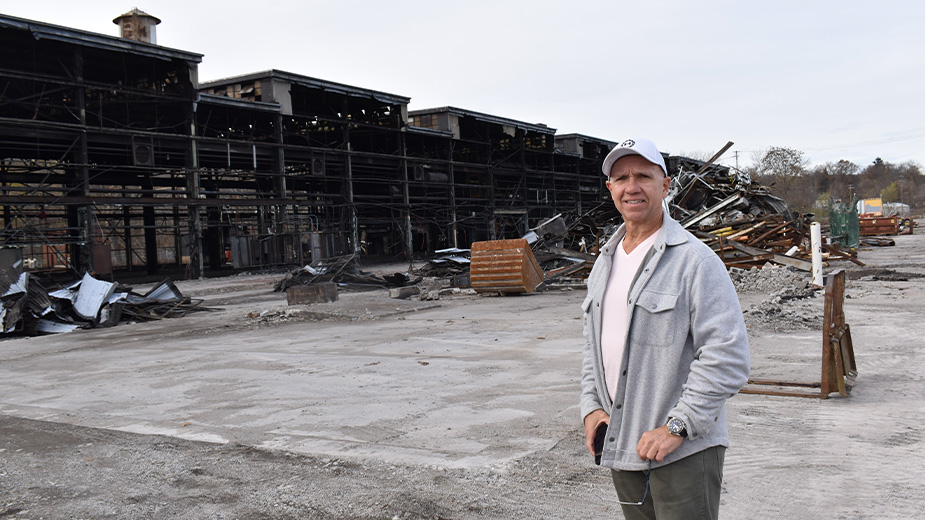City Seeks Council OK for Chill-Can Plant Incentives
YOUNGSTOWN, Ohio – Members of City Council’s Community Planning and Economic Development Committee were updated Monday on a California company’s plans to develop a $20 million beverage complex and technology campus on the East Side.
The committee approved putting an ordinance before City Council at its meeting Wednesday that would authorize the city and its Board of Control to negotiate terms and enter into a development agreement with M.J. Joseph Development Corp. for the project.
The company plans to develop a campus to house a warehouse, plastics, bottling and corporate operations for its self-chilling can product on a 20-acre site bounded by Oak Street, Lane Avenue, Fruit Street and Himrod Avenue. The Business Journal first reported Saturday on the project, disclosed by Mitchell Joseph, CEO of Joseph Company International and a Youngstown native, during a lecture at Youngstown State University.
“Obviously this is a project that we’re very excited about,” said T. Sharon Woodberry, Youngstown’s director of community planning and economic development. “It wasn’t an easy deal,”
The company’s history dates to 1921, when it operated a bottling plant in the area where it proposes to build the new plant, Woodberry said. “It is not a startup but this is a new venture that they are working on,” she said.
The ordinance proposes a site development grant of up to $1.5 million, demolition assistance, and acquisition and conveyance of property for the project. The funding would come from the city’s business development, environmental sanitation, water and wastewater funds.
The city has negotiated purchase agreements with property owners for all of the first phase of the project, Woodberry reported. Discussions continue with property owners for the final four parcels for the second phase.
Mayor John McNally said after the meeting the city might have reached an agreement with one of the remaining property owners, leaving three to come to terms with.
The city has demolished the properties it agreed to take down in the Phase 1 area, and the company will take down remaining properties using funds from the $1.5 million grant, Woodberry said.
Joseph Company will be reimbursed from grant funds for the site work, which could get underway in the next month and a half, she added.
Although the company is unwilling to disclose financial information for competitive reasons, officials said, it put $250,000 in escrow and executed a performance bond in excess of $1 million for the project. “That’s very unusual for a company to take that step,” city Finance Director David Bozanich said. “They did give us the guarantees that we were looking for in order to be sure they were going to go forward with the project.”
It’s similar to what the city does in its float loan program, he continued. “If somebody gets an unconditional letter of credit from the bank we don’t require financial statements because the bank has reviewed all that,” he said
The plant would generate an estimated $5 million in annual payroll or $138,000 in additional income tax for the city, Woodberry said. Pay would range from $8 per hour for entry-level non-skilled positions to $20 per hour for higher-end professions. Employment would be phased in over three years as the campus is developed.
“It is an area that is in dire need of the type of investment,” Bozanich said.
Joseph has a “working relationship” with Youngstown State University, Woodberry said. “One of his primary goals is to be able to utilize its engineers and provide a pipeline for those who are graduating,” she said.
The development agreement would include standard language asking that the company to make a “best effort” to hire half of its employees from city residents, but Woodberry acknowledged there typically are problems reaching those goals when it comes to hiring skilled employees. “You have to hire where they are,” she said.
In addition, the project developer will be seeking help from the state of Ohio, which has its own provision to encourage hiring from among Ohio residents.
The company is initially targeting the beverage industry with its self-chilling can technology but also is looking at the cosmetics industry and NASA, Woodberry said.
The administration also plans to seek council’s approval for a 10-year, 75% property tax abatement, Woodberry said. That portion of the request wasn’t before the committee because state law requires the Youngstown Board of Education to be notified 14 days in advance of action on such a request.
Council members expressed their enthusiasm for the $20 million project even as they lamented the impact on property owners in the neighborhood.
Councilman T.J. Rodgers, D-2nd Ward, chairman of the community planning and economic development committee, said in his five years on council the issues he has probably heard about most is the lack of investment on the East Side. “This represents an effort to invest on the East Side,” he said. “It was a difficult situation that we had to work through and are still working through. It’s important that we treat those residents fairly. … This needs to be something that everybody is happy about.”
The project comes “with a little discomfort,” Councilman Julius Oliver, D-1st Ward, acknowledged. He said he appreciates the administration is working with the property owners involved to make sure they receive “fair and equitable treatment.”
McNally praised Woodberry, Bozanich and other members of his administration for their efforts.
“This is the beginning,” he said, indicating the Wick Six area as the next potential area of focus for development efforts.
“We have interested parties starting to ask us questions about that Wick Avenue property and what can be done,” the mayor continued, although he acknowledged those discussions are not as advanced as those involving the East Side project area.
Bobbe Reynolds, an East Side resident who attended the meeting, said she knows people in the project area where the city is working on acquiring land. She contended the city could have done more to persuade the developer to use other property that was available.
“I’m all for economic development,” she said. “I’m not so much in favor of displacing people because there’s so much other property that’s available where you would not have to displace anyone from their homes.”
PREVIOUS:
$20 Million ‘Chill-Can’ Plant, 250 Jobs Coming to City
Copyright 2024 The Business Journal, Youngstown, Ohio.



